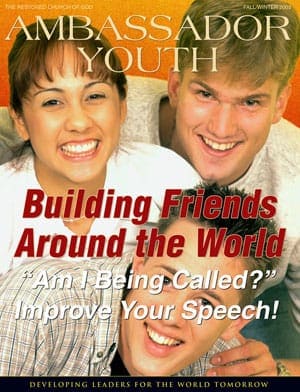Right or wrong, and whether you like it or not, when you speak, people evaluate you by the words you use. They will form opinions. They may decide if youāre rich or poor, educated or ignorant, smart or dumb. They may determine whether or not they like you, whether you are someone to befriend or to avoid. They may want to listen more or plug their ears. What you say and the words you use will have a lasting effect on yourself and those around you. They can either help you advance in all areas of your life, or hold you back.
We are nearing the end of 6,000 years of mankind going its own way. Every aspect of manās society is becoming more and more degenerate. From television and movies, to peopleās actions, conduct, dress and languageāall have degenerated.
After listening to some people speak, you may scratch your head and ask yourself, āWhat did they say?ā You may wonder if they were ever even taught how to speak. Still, after listening to others, you may feel the need to wash your ears out with soap!
When an NBA basketball player was recently asked about traveling to Japan to play a game, he had this to say: āI want to go somewhere where they got all the electronics they donāt got here, so I can get some and then I can be hot stuff because I got stuff they aināt got hereā (The New York Times). This is hardly a mastery of the English language.
Some simply cannot talk without using obscene or vulgar language. This is becoming especially common with todayās youth, among whom the trend is toward filthy, slang and corrupted words.
When actor/rap artist Will Smith was asked why he did not use swear words in his song lyrics, he replied that his grandmother found some of his profanity-laden lyrics and wrote on them. She gave him a very good piece of wisdom. Her note read, āDear Willard, intelligent people do not use these words to express themselves.ā
Many people are unable to properly express themselves because they lack a broad vocabulary base from which to pull words. That makes it harder for them to convey their thoughts and ideas to others. It can also cause misunderstandings and unnecessary offense. This can happen between family members, fellow workers and friends. Remember, the words you use have an effect on others. That effect can be good or bad, positive or negative. What you say has the power to either raise the hearer up or tear him down.
Notice what the book of Proverbs has to say about words: āA word fitly spoken is like apples of gold in pictures of silverā (25:11). When the right words are spoken, and at the right time, they have greater appeal to the hearer. And, as a result, those words are more likely to be received and acted upon in a positive way.
Known By Your Words
Trees and plants are known by the fruit they produce. An apple tree produces apples, a pear tree, pears and a plum tree, plums. It is the same with plants. You can identify a tomato plant because it produces tomatoes and a pepper plant because it produces peppers. And after eating the fruit that a tree or plant produces, you will know if it is good fruit or bad fruit.
The same is true of people. You can come to know a lot about someoneāwhat kind of āfruitā he producesāby tasting (hearing) his fruit. And others will learn about and come to know you by hearing the fruit (words) you speak.
Listen to this admonition from Christ: āEither make the tree good, and his fruit good; or else make the tree corrupt, and his fruit corrupt: for the tree is known by his fruit. O generation of vipers, how can you, being evil, speak good things? For out of the abundance of the heart the mouth speaks. A good man out of the good treasure of the heart brings forth good things: and an evil man out of the evil treasure brings forth evil thingsā (Matt. 12:33-35).
When you speak, others are learning about you. They are learning whether you are a well-spoken, intelligent person who speaks and expresses clean wholesome words, thoughts and ideas from a clean and pure heartāor someone who may not be well educated, who resorts to using foul, base, degenerate words that express foul, base, degenerate thoughts and ideas from a heart
that is foul, base and degenerate.
Which way do you represent? What are you revealing about yourself to others? Do your words set the right example?
Four Guidelines
Here are four guidelines from Godās Word that you should employ in striving to improve your speech. They are found in Ephesians 4:29: āLet no corrupt communication proceed out of your mouth, but that which is good to the use of edifying, that it may minister grace unto the hearers.ā
Let no corrupt communication come from your mouth. What you say should be wholesome and of value and have some redeeming quality. It should be able to be heard by the very young, the old and everyone in between.
Speak what is good. What you say should build others upānot tear them down. Your words should edify
those who hear them. Even any corrective comments toward another should be said in a positive, uplifting way.
Speak what is good for necessary edification.
Not only should you know what to say, you should also know when to say it. Your words must be said at the right time and in the right place. Those to whom you are speaking may not be ready or willing to listen at that time. Your speech should never be arrogantāor have an āI told you soā or āslap in the faceā attitude.
Your words should give grace to the hearer. The words you speak should give happiness and be pleasing to anyone who might hear them. They should be able to be repeated by others. They need to be spoken with respect and in a right and proper tone. Those hearing your words should feel that they have received grace and mercy from them.
Expand Your Vocabulary
With these guidelines in mind, set out to expand your vocabulary. You can learn to speak and express yourself more effectively by having a wide range of words you can use. You can accomplish this by reading a wide variety of books and magazines (of the right kind, of course) and the newspaper. Read Godās Word, which He says is refined seven timesāit says exactly what God wants it to. Read the autobiographies of Herbert W. Armstrong, Benjamin Franklin, Abraham Lincoln and others who had a mastery of the English language.
Always try to increase your pool of words. When you read a word you have not seen before, take the time to look it up in a dictionary. Find out what it means. Try to use it as the occasion arises. Or simply just read the dictionary and the definitions of words. If you happen to have access to a Readerās Digest, use their regular feature called āWord Power.ā You will also find our feature āIn Other Words...ā of benefit in expanding your vocabulary. Use these tools to learn new words and their meanings. It works!
Remember, you can be the master of your wordsāor your words can master you. Which will it be?
















